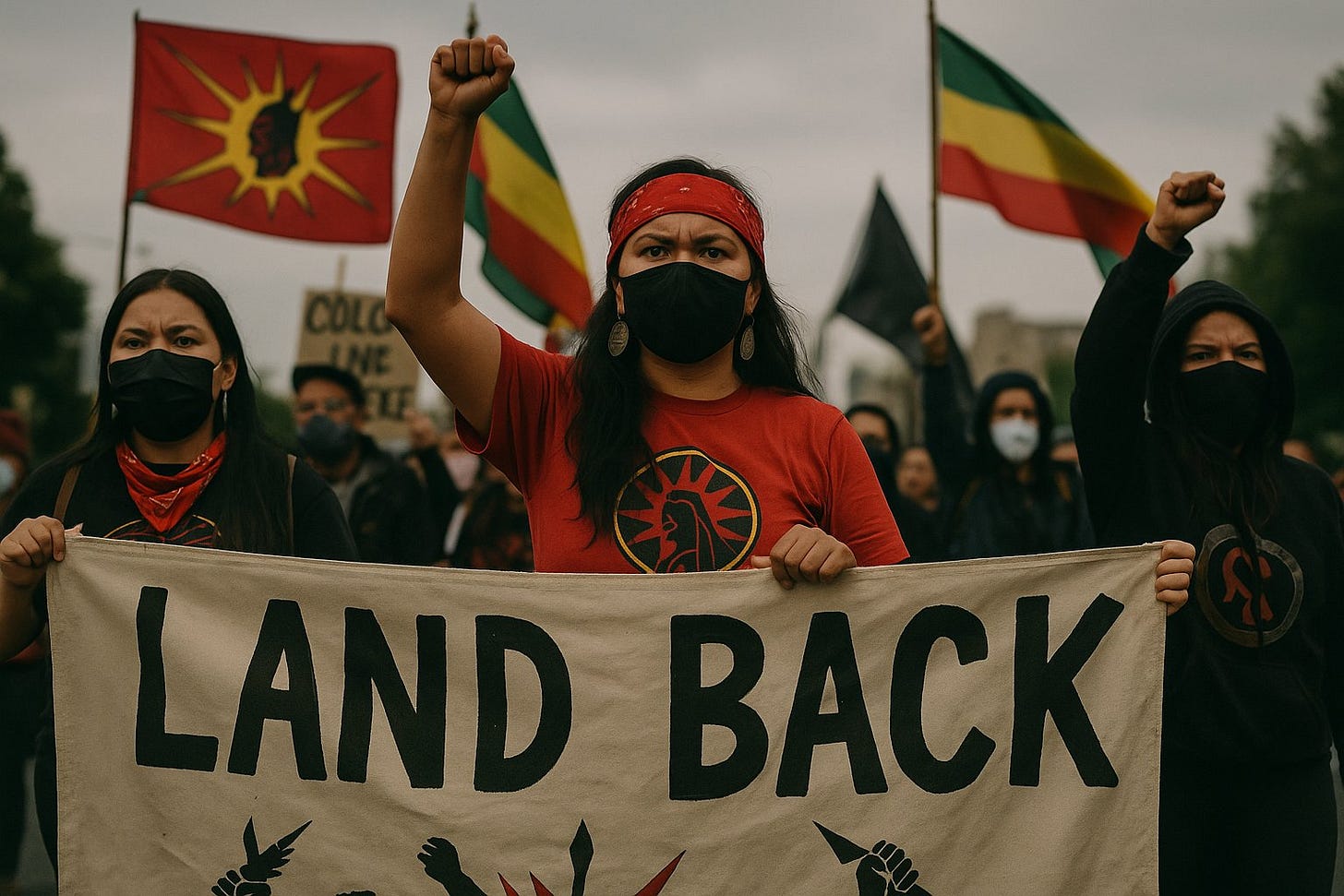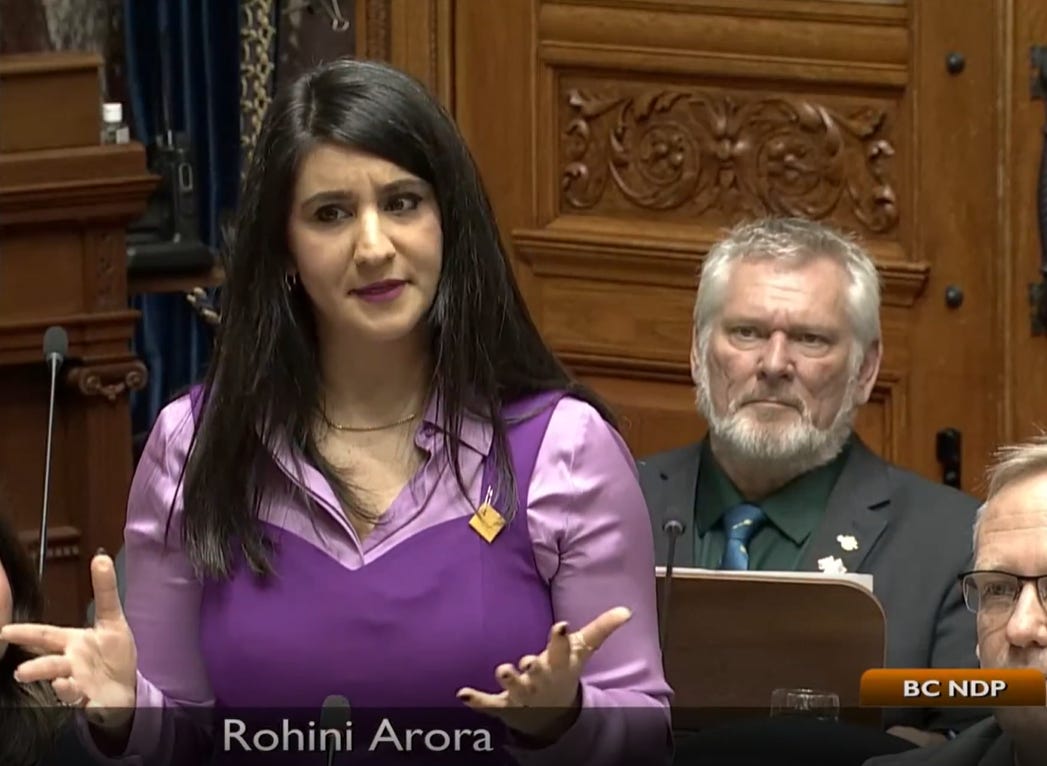At a recent sitting of the British Columbia legislature, NDP MLA Rohini Arora rose to deliver what she framed as a gesture of solidarity. She insisted that non-Indigenous Canadians should refer to themselves as “settlers,” and that white Canadians, in particular, should go further—calling themselves “colonizers.” 1 Her reasoning, she explained, was not to assign blame, but to act as a reminder that Canada was born from the oppression of Indigenous peoples. These terms, she said, are tools of reflection, not division.
But of course, they do divide us. The very function of such language is to sort people into moral categories based not on what they’ve done, but on who they are. These are not descriptors of action or character, but of ancestry. They mark people, not as citizens, but as participants in a historical events they had no part in.
Arora described herself as a settler, born in Canada to a family that arrived from India through what she called “Canada’s colonial immigration system.” She stated plainly that this country and its institutions were built upon the displacement of Indigenous peoples. Yet there is not a single Canadian alive today who settled or colonized the land. These were acts carried out centuries ago. Settling involves building something where there was nothing. Colonizing involves imposing foreign laws on a people and a place. Both are historical processes, not personal choices.
Arora insisted this wasn’t about blame, but about a “shared responsibility.” What that responsibility entails, she didn’t say. What is it, exactly, that I am supposed to atone for? Canada was founded in 1867. Unless there’s a 158-year-old Canadian somewhere, there isn’t a soul alive today who was involved in any of this. And yet, Arora concludes, “True reconciliation means recognizing that Canada was built on the lands and suffering of Indigenous peoples.” It would seem that the redefinition of citizenship begins not with the rule of law, but with a confession to the sins of those long dead.
What Rohini Arora offered in the legislature was part of a deeper cultural instinct—what philosophers refer to as oikophobia, the repudiation of one’s own people and traditions. The idea itself isn’t new. It echoes the worldview of the early 20th-century American “Young Intellectuals,” a clique of bohemian writers and poets who gathered in Greenwich Village just before the First World War. Their aesthetic was modernism, but their politics were clear: majority groups were parochial and oppressive, while minority cultures were vibrant, authentic, and liberating.
The Young Intellectuals sought to escape the dominant White Anglo-Saxon Protestant culture which they viewed as parochial. To them, it was dull, repressive, and morally spent. Instead, they sought out jazz clubs in Harlem and Yiddish theatres on the Lower East Side, not as guests but as cultural tourists. To them, it was an early form of liberation from the “indistinguishable dough” of their forefathers. Sampling the exotic was their way of resisting what they saw as the puritanical dead weight of their own heritage.
Among them was Randolph Bourne, a New England WASP himself. Bourne argued that American identity should not be defined by Anglo norms, but as a federation of international colonies. He believed immigrant cultures should retain their traditions and resist assimilation, while the WASP majority should dissolve itself into a cosmopolitan pluralism. Their redemption, he believed, would come by rejecting their own identity and embracing the cultural life of the immigrant “other.” At the same time, those immigrants were to be encouraged to resist the pull of assimilation so that their traditions could remain intact, untouched by the hegemonic influence of the majority.
Eric Kaufmann later called this asymmetrical multiculturalism2—a system where ethnicity and tradition are considered essential for minorities but are pathologized when retained by majorities. The past hundred years have merely refined Bourne’s framework. Today, it animates much of what we call “diversity, equity, and inclusion.” Bourne was mostly concerned with aesthetics rather than oppression, but the instinct is the same: to define the majority by its guilt, and the minority by its virtue. Arora’s rhetoric fits squarely within this tradition. Her call for Canadians to label themselves “settlers,” “uninvited guests,” and “colonizers” is just the latest expression of a century-old desire to escape one’s own inheritance by kneeling before someone else’s.
As MLA Arora states, land is unceded when it has not been formally surrendered. The land acknowledgements that now open public ceremonies, university events, and legislative sittings are not symbolic gestures. They are statements of unresolved claim. When Indigenous activists say the land was never ceded, they are saying they did not agree to your presence. If the land was never given up, then you are on it without permission. And if you are there without permission, then you are, in their words, a settler, an uninvited guest, a colonizer. That language is not poetry. It is the language of eviction.
The Land Back movement is a political engine that lurks behind these acknowledgements. Its premise is simple: land taken, or unceded, must be returned. The implication, however, is far from simple. If the goal is to restore land to its rightful owners, then those currently living on it have a problem. You cannot be both a permanent citizen and a temporary trespasser. If you tell people for long enough that the land they occupy was stolen, and that they have no rightful claim to it, you should not be surprised when they begin to believe it. And once they believe it, you should not be surprised when Land Back activists begin to act on their demands.
The idea that land belongs inherently to a particular racial or ethnic group is not a new one. In another time and place, it was called "blood and soil." The Nazis used the concept to fuse national identity to ancestral land, arguing that a people and their territory were bound by bloodline. Outsiders had no place in this worldview because they did not share the sacred connection to the soil. Land was not just property. It was the vessel of cultural survival. The Land Back movement, while vastly different in moral tone and historical context, mirrors this framework in structure. It binds land to identity, and identity to legitimacy. The result is a form of ethno-territorial politics.
Supporters of Land Back will insist that the comparison is unfair, and in some respects it is. The historical crimes committed against Indigenous peoples in Canada are real and well-documented. The movement seeks redress, not conquest. But the philosophical overlap cannot be ignored. Both Land Back and blood-and-soil ideologies assert that certain people have an exclusive relationship to land based on ancestry. Both suggest that political legitimacy comes from racial heritage, not law. And both imagine the land not as a neutral space to be shared, but as a sacred inheritance to be defended or reclaimed.
This matters because symbolic gestures, once institutionalized, have a habit of becoming rather less polite. If Canadians are taught that they are living on someone else’s land, and if their presence is framed as inherently illegitimate, then reconciliation ceases to be about healing. It becomes about retreat. Can we really say that the endgame of such a framework is equality when there’s an implicit undercurrent of eviction? The terms “settler,” “colonizer,” and “uninvited guest” are not intended to describe a past event. They are meant to define your status in relation to the owners of the land in the present.
In South Africa, a similar ideological framework was put into practice after the fall of apartheid. The language was different—equity, restitution, transformation—but the structure was familiar. Land reform policies, supported by Broad-Based Black Economic Empowerment (B-BBEE), sought to return land to Black South Africans dispossessed by colonial rule. These programs were informed by a DEI-style ideology that framed land not only as economic capital but as cultural identity. Land was where dignity would be restored.
The results have been complicated. While some communities benefited from land restitution, others faced a different reality. White farmers have been murdered in disproportionately higher numbers compared to black farmers since the 90s, many under conditions that suggest politically or racially motivated violence3. Critics argue that the rhetoric around land expropriation without compensation inflamed resentment, creating an environment where historical grievances were easily weaponized. The South African example shows what happens when land politics becomes infused with inherited guilt and tribal entitlement. Violence does not need to be officially sanctioned to be socially justified.
Canada is not South Africa. But the ideas are beginning to rhyme. When Indigenous activists chant "Land Back," they are not asking politely. They are demanding a moral and political transfer of territory. They are claiming racially determined rights, not to equality under the law, but to the soil itself. And when elected officials like MLA Rohini Arora tell you that you are a settler or a colonizer, they are not asking for partnership. They are declaring your presence conditional.
You cannot build a peaceful, multi-ethnic democracy on a foundation of inherited guilt. If citizenship is permanent for some and revocable for others, the entire concept collapses. The Land Back movement cannot coexist with liberal democracy if it continues to define political rights based on blood and ancestry. Either we are all citizens, or we are all tribes fighting to get ours.
I don’t want to ignore the complexity of history. I do, however, want to prevent it from being used as a blunt weapon. Reconciliation should mean equal dignity. It cannot mean permanent moral debt. And it certainly cannot mean surrendering your rights in the country you were born into simply for having the wrong genetics. If the ground beneath your feet is no longer yours, then neither is the country.
What MLA Rohini Arora offered in her speech was not a direct condemnation of any particular group. She didn’t need to say it outright. The implication was already built into the framework. If one group is uniquely righteous—spiritually connected to the land, historically victimized, and morally infallible—then another must be the villain. The terms “settler,” “uninvited guests,” and “colonizer” describe what certain people are, and therefore what they deserve. Within the labels, we find a slow-moving purge of national identity, repackaged as compassion for the dispossessed. When we’re told to accept these labels, we are being instructed to surrender our shared nationhood. We are told to see our presence as conditional, our rights as borrowed, and our futures as forfeit lest we repent for the actions of ancestors we never knew.
There is no statute of limitations in this model—only permanent guilt, tied to skin colour, ancestry, and birthright. It’s not just white Canadians who are being sorted into this caste. Anyone who doesn’t meet the threshold of indigeneity is placed in the same moral holding pattern: guest, invader, occupier.
This should concern every citizen who believes in a civic nation, one where rights are universal and not contingent on race or bloodline. Because once guilt becomes inherited and land becomes sacred to for some, the future becomes unstable for all. We have seen, in places like South Africa, what happens when this kind of ideology takes hold. Land reform turns into retribution. Identity politics becomes state doctrine. And reconciliation becomes a justification for revenge.
So, next time someone imposes a land acknowledgement, you can just refuse.
Melanie Bennet is a British-Canadian researcher, investigative journalist, and host of Disrupted; a Youtube culture and politics show with True North. Melanie's work explores the ideological and political shifts in Canadian society, with a particular focus on education.
Kaufmann, E. (2004) The Rise and Fall of Anglo-America.
https://www.accord.org.za/ajcr-issues/farm-attacks-or-white-genocide-interrogating-the-unresolved-land-question-in-south-africa/










Fantastic piece!
Land acknowledgment need to stop. Treaty land is not Indigenous land, on thevprairies anyway, it's crown land. Land acknowledgments give the uninformed the impression that some have a valid claim when they don't.